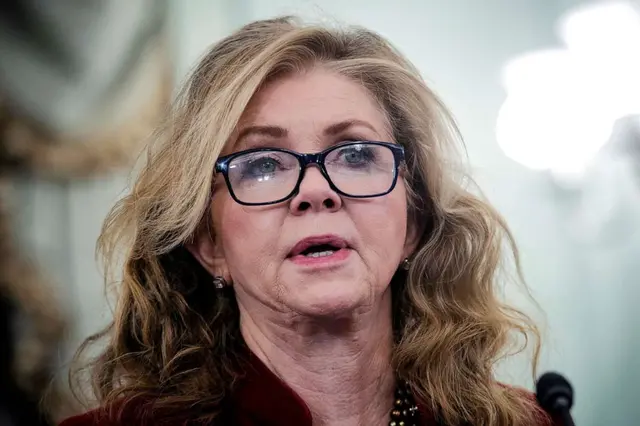A slew of prominent conservative political figures and conservative news outlets recently fueled a viral false report that claimed the Biden administration was preparing to spend $30 million in federal funds to distribute free crack pipes.
But that claim is not true, the Biden administration says.
The origin of the claim was a misleading report from the Washington Free Beacon, which cites a Department of Health and Human Services grant program that provides funds for "safe smoking kits" but made a misleading claim that "crack pipes" were part of them.
The program referenced in the report stems from a notice published in December on the website of the Substance Abuse and Mental Health Services Administration, which is part of HHS.
SAMSHA was looking for organizations to apply for nearly $30 million worth of grants as part of a program the Biden administration was running to reduce the harm of drug addiction in communities across the country. The program, called the "Harm Reduction Program Grant," is intended to support syringe services, overdose prevention programs and other services. Applications were due Feb. 7.
SAMSHA told the organizations in a 75-page document about the grant program that among the many things grant funding could be used for was to "purchase equipment and supplies to enhance harm reduction efforts."
One of the dozen things the document gave as an example of "equipment and supplies" was "safe smoking kits/supplies."
The program does not clarify what should be included in the smoking kit, but according to Harm Reduction International, they can include rubber mouthpieces, brass screens, lip balm, disinfectant wipes and glass stems. Organizations would also have to comply with local and state laws regarding what is included.
Republicans were quick to criticize the administration. Sen. Marsha Blackburn, R-Tenn., threatened to hold up temporary government funding if the administration couldn't assure her that no federal funds will be used to purchase "drug paraphernalia," but lifted her hold on the bill after receiving a written answer from HHS Sec. Xavier Becerra "committing that no taxpayer dollars will be used to fund crack pipes," a Blackburn spokesperson told ABC News.
Sen. Marco Rubio, R-Fla., has also introduced legislation that bars federal funds for pipes.
The Biden administration pushed back strongly on this report and has stressed that no federal funds have gone out yet and insisted they will not be used to fund crack pipes.
"No federal funding will be used directly or through subsequent reimbursement of grantees to put pipes in safe smoking kits," HHS Secretary Becerra and the head of the Office of National Drug Control Policy, Rahul Gupta, said in a statement on Wednesday.
White House press secretary Jen Psaki came out with a strong denial that the administration ever intended to provide funding for crack pipes.
"They were never a part of the kit," Psaki said during a daily press briefing. "It was inaccurate reporting and we wanted to put out information to make that clear."
She was asked directly: "Does the administration support any effort then to distribute drug paraphernalia like the types that we were hearing about?"
But Psaki reiterated that the administration doesn't "support federal funding, indirect or direct, for pipes."
Sarah Lovenheim, chief HHS spokesperson, subsequently sent ABC News a similar explanation making clear that no federal funds have gone out.
"The Biden-Harris Administration has never authorized the use of federal funding for smoke pipes and will not in the future. We have not yet approved any harm reduction grants and no money for the program has gone out."
The original report from The Washington Free Beacon said the Biden administration would distribute "crack pipes'' to drug addicts as part of its plan to advance 'racial equity.'" He also claimed an HHS spokesperson told the outlet that smoking kits "will provide pipes for users to smoke crack cocaine, crystal methamphetamine and 'any illicit substance.'"
But an HHS spokesperson told ABC News there was never a question from the reporter or a confirmation from HHS staff that a "glass pipe" was part of the kits.
They say the reporter "omitted the information shared with him about the grantees needing to comply with federal, state, and local laws" and that he never "asked a question about pipes."
The original inquiry with HHS on Feb. 2 was for clarity on the "safe smoking kits/supplies" and asked if the department could "specify what these kits are and how they can help with harm reduction in communities?"
Staff replied saying that SAMHSA does not specify the kits' elements and only the parameters.
When he asked if the "kits intended to help users reduce risk when smoking crack and meth," HHS told the Washington Free Beacon they wouldn't limit it to those two substances and it "would reference 'any illicit substance.'"
Municipalities across the U.S. have instituted harm reduction programs and provide safer smoking equipment to mitigate the effects of drug use and addiction. According to the Drug Policy Alliance, the primary objective is to reduce health risks from sharing smoking supplies, which could spread infectious diseases such as HIV and viral hepatitis, and reduce the risk of injecting drugs, which could also lead to viral infections and a risk of overdose from some drugs such as heroin.
(ABC)
 简体中文
简体中文

